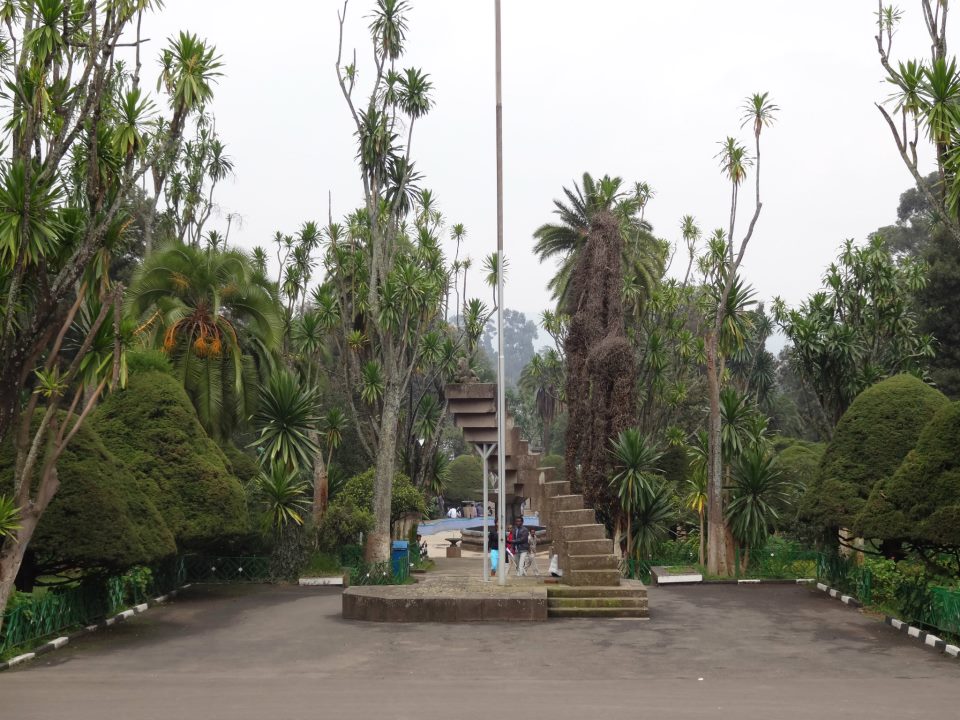Îmi încep călătoria în Dubai, care în afară de faptul că e foarte urât, pare să fie un loc complet imoral. Imoralitatea are nevoie de stil ca s-o faci atractivă, iar Dubai nu are deloc stil. E ca un vast hotel de cinci stele. Deși e un loc unde oamenii pot bea în mod normal alcool fără nicio problemă, mâncarea și băutura de orice tip, cu excepția celor la pachet, nu sunt de găsit înaintea asfințitului pe perioada Ramadanului. Fiecare zi îmi începea cu un drum prin căldura încinsă, până la Starbucks sau Costa, ca să-mi cumpăr micul dejun pe care să-l aduc acasă într-o pungă maron de hârtie. Cum mai poți scrie despre călătorii în era Starbuck și Costa? Dubai în august, în vremea Ramadanului (și probabil în oricare altă perioadă) e o plictiseală totală, dar mă trezesc deodată stârnit de gândul la Etiopia, care are un climat temperat și ploios, așa cum ar trebui să fie verile – chiar și în Zanzibar sunt doar 28 de grade Celsius. Încep să mă simt bine.

Prima dimineață la Addis Ababa iau dejunul la hotel, cu cea mai bună cafea din câte îmi amintesc. Cappucino-ul e minunat pentru că și cafeaua e minunată. N-am gustat niciodată ceva cu așa aromă puternică. Ca atunci când am văzut primul original al unui tablou al vechilor maeștri ai picturii, după ce până atunci văzusem numai printuri. Sau ca primele roșii din Balcani pe care le-am mâncat la începutul anilor 90.
Sunt împotriva fumatului dar prezența scrumierelor în camere îmi dă un desfătător sentiment al libertății. Anglia era odată o țară liberă unde oamenii spuneau și făceau ce le plăcea. Acum nu mai e așa.
16°C, înnorat, prognoză de furtună cu descărcări electrice la Addis Ababa – un rai după Dubai (doar 41°C dar umezeală). E minunat să scapi de Ramadan. Tot ce am de raportat la început e berea excelentă și femeile frumoase. Pe drum, în avion, erau multe asemenea femei cu fizionomie europeană și (după expresia lui George Meredith) posterioare de regine. De fapt, fetele drăguțe din avion erau mai multe și mai drăguțe decât cele de pe străzi.
Mergem spre Hilton în atmosfera gri și răcoroasă – Addis e plin de arbori ciudați iar verdele e o culoare minunată. Mă simt ca în Anglia la sfârșitul lui octombrie, înaintea unei furtuni dintr-un loc excentric precum Cambridge, plin de grădini înconjurate de ziduri. Cumpăr cinci zboruri interne pentru un total de 280 de dolari. Sunt foarte mulțumit de asta, acum am un itinerariu.
Vremea e plăcută, răcoroasă, ploioasă, ca în acea vară englezească din copilărie, dinainte de a mă muta în Balcani. E sezonul ploios, dar sunt ploi ușoare – de fapt un anotimp numai bun pentru vizită.
Așadar ne aflăm în Addis și nu în Lalibela, cum speram, dar profităm din plin vizitând Muzeul Național de Etnologie. Care e cel mai puțin impresionant muzeu din câte am văzut. Cel mai atrăgător lucru la el e clădirea în care e adăpostit și parcul în care se află aceasta – un fost palat al lui Haile Selassie (regentul Etiopiei din 1916 până în 1930 și Împărat al Etiopii din 1930 până în 1974).
Pe stradă, un buchinist vinde cărți comuniste. Aici comunismul a ucis numeroși oameni dar totuși mai sunt unii care spun că adevăratul comunism nu a fost niciodată aplicat. Am întâlnit etiopieni care plâng după el.
Vizităm catedralele Sf. Gheorge și Sfânta Treime. Ambele au muzee cu manuscrise antice, scrise în limba moatră Ge’ez, care se mai păstrează în liturghii. La Sfânta Treime se află mormântul lui Haile Selassie. La Sf. Gheorge doi oameni se loveau, repetat, cu capul de ușile bisericii. Unul a fost înșfăcat de un tip înalt în uniformă militară care arăta precum un soldat al „albilor” din războiul civil din Rusia, doar că era negru. Știam că aici e o civilizație la fel de veche ca cea din Georgia, mai veche decât cea din Siria. Și totuși interioarele bisericilor arată ca ale unei biserici baptiste din anii 70 în Anglia. Picturile interioare sunt mâzgăleli europene ieftine. Preotul n-am cântat. Muzica liturgică etiopiană e frumoasă, dar nu sună deloc a muzică religioasă. Mi s-a părut că aduce vag cu jazz-ul. Perotul ne explică despre toba ceremonială și semnificațiile ei. Coardele reprezintă biciul lui Dumnezeu – capătul subțire pentru naștere și cel gros pentru moarte.
Etiopia e un loc tare ciudat într-o lume în care au rămas foarte puține locuri ciudate. Îmi place.
Cina de la Yad Abysinnia, lângă aeroport, mi-a plăcut. Curry-urile etiopiene sunt excelente, ca și alte feluri de mâncare de aici. Vinul – straniu dar băubil – are gust de sherry sec.
Etiopia încă păstrează calendarul Iulian. Aici suntem în 2004. La 7 p.m. aici e ora 1:00 iar la 19:00 e din nou ora 1:00, ceea ce e nemaipomenit de logic.
A doua zi luăm avionul spre Lalibela, care se oprește mai întâi la Gonder. Pe ambele aeroporturi e loc doar pentru un singur avion și amândouă par a se afla pe acoperișul lumii. Aer rarefiat de munte, lumină rece, dealuri, verde adânc.
Mergem cu mașina printr-un frumos peisaj de țară către hotelul Seven Olives (25$ pe noapte).
Iau prânzul: o versiune simplificată de tibs, destul de bună. Bucăți de carne de miel în sos așezate într-un morman și sfârâind la flacără, mâncate cu injera, care e făcută dintr-o cereală locală, are culoarea gri și arată ca o spumă de cauciuc. Echivalentul românesc al injera este mămăliga, sau polenta din Italia. Cafeaua de la hotelul meu din Lalibela este crescută în grădină. Cred că în Etiopia am băut cea mai bună cafea, poate că e chiar cea mai bună din lume. Etiopienii spun că ei au inventat cafeaua. Presupun că vreau să cred asta, deși nu știu dacă a fost vorba despre etiopienii creștini sau cei musulmani.
Da, Lalibela e turistică – un fel de Sighișoara acum mai mulți ani – să zicem 2002. Dar turiștii sunt foarte puțin în comparație cu orice loc turistic din Europa în August. Cu toate că are o populație de numai 20.000, Lalibela îți absoarbe turiștii destul de bine.
Pornim într-un tur, pentru 180 de dolari (două zile), mai mult decât aflăm ulterior că era cazul să plătim. Mai întâi vizităm trei biserici. La una din ele preoții insistă să le dăm 5 dolari înainte să deschidă porțile. Suntem la vreo 3000 metri deasupra nivelului mării și urcușurile dintre o biserică și alta mi se par dificile.
Un om pe care îl întâlnim ne invită la o cafea în sat. Sătenii știu citi și unii vorbesc engleză, dar parcurg mai multe mile, uneori în picioarele goale, prin noroi pentru a aduna lemne de foc.
A doua zi e răcoare. Arareori termometrul ajunge la 20 de grade aici. Etiopia e unul din puținele locuri din emisfera nordică unde să te duci în august, ceea ce e a) interesant și b) nu excesiv de călduros.
Mesa din Lalibela din ziua Salvării Lumii a fost una din cele mai extraordinare experiențe din viața mea.
La ieșire, i-am cumpărat unui băiat de zece ani o pereche de pantofi cu 9 dolari. Cea mai plăcută achiziție pe care am făcut-o vreodată. Ultima lui pereche se stricase acum un an.
Etiopia ar trebui să convingă pe oricine că scurta perioadă de colonizare europaeană a Africii a făcut mult bine, dar și ceva rău. Pe de altă parte, Etiopia e atât de convingătoare fiindcă nu a fost europenizată și reprezintă singura țară africană cu o istorie și o cultură datând din antichitate.
Etiopia în august are cel mai profund verde imaginabil, e ploiasă, răcoroasă, plină de arbori ciudați și credincioși mergând la mesă în robe translucide și cu pălării stranii.
De la Lalibela zbor la Dire Dawa, care e, prin contrast, tropicală și are un aer caraibian. Un minibuz aglomerat ne duce printr-un peisaj minunat la Harar. Harar, pe care l-am ales instinctiv, fără să mă documentez, e plin de oameni care beau bere și de prostituate, dar orașul vechi promite ceva diferit. Hotelul unde stau pare o serie de baruri zgomotoase și un bordel, dar mai târziu aud că e cel mai bun hotel. Mă mut totuși la un altul care costă 10 $ și are un restaurant bun și internet cafe. Aici mă împrietenesc cu Hailu, un tip simpatic și mănânc un platou yemenit care se cheamă Luni, sau așa ceva.
Harar e ceva autentic. Zona muntoasă cu bisericile și castelele ei e impresionantă dar să mă trezesc aici, în această închisoare stalinistă pentru care plătesc zece dolari (cu un mic dejun excelent), mă transfigurează.
N-are sens să mai mergi la Zanzibar după Harar, dar trebuie să-mi onorez biletul de avion.
Moscheele din Constantinopol fac Islamul să arate foarte atrăgător dar aici, deși este exotic pentru călătorii albi, Islamul mă frapează ca utilitarist și manufacturat. E foarte spiritual dar pare să-i lipsească o dimensiune. Din nu știu ce motive, în această călătorie Islamul mi-a amintit de comunism.
 După o săptămână de la sosirea în Etiopia, sunt înapoi la Addis Ababa.Consider că hotelurile de lux sunt imorale și profund corupte, dar cred că eu am nevoie de ele mai mult decât majoritatea oamenilor. Primesc mult mai mult decât plătesc de la hotelul Jupiter Cazanchis din Addis. Mi-a devenit un soi de mamă-surogat de la al cărei sân nu mai pot să mă desprind.
După o săptămână de la sosirea în Etiopia, sunt înapoi la Addis Ababa.Consider că hotelurile de lux sunt imorale și profund corupte, dar cred că eu am nevoie de ele mai mult decât majoritatea oamenilor. Primesc mult mai mult decât plătesc de la hotelul Jupiter Cazanchis din Addis. Mi-a devenit un soi de mamă-surogat de la al cărei sân nu mai pot să mă desprind.
Dormitorul meu de la etajul întâi e deasupra intrării hotelului de patru stele. Puțin la stânga se văd tufișuri în care sunt căsuțe mici făcute din fier ondulat, lângă un morman mare de plăci de faianță sparte. În fața uneia din case, doi băieți spală o pereche de blugi cu o bucată de săpun.






















